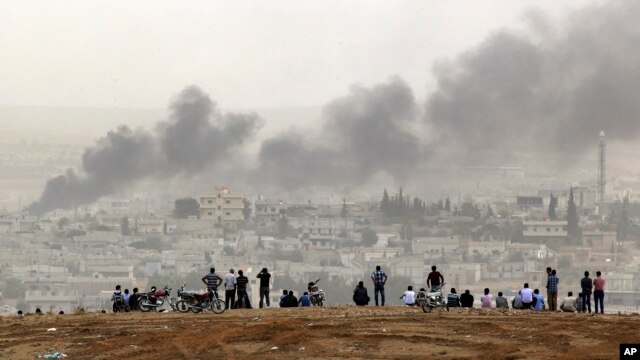Pentagon: Hundreds of Islamic State Militants Killed in Fight for Kobani
People on a hilltop watch smoke rising from a fire caused by a strike in Kobani, Syria, during fighting between Syrian Kurds and the militants of Islamic State group, on the outskirts of Suruc, at the Turkey-Syria border, Oct. 11, 2014.
October 16, 2014 5:16 AM
WASHINGTON—
The U.S. Defense Department said several hundred Islamic State fighters have been killed in the battle for the northern Syrian town of Kobani, as the tempo of U.S.-led airstrikes quickens. The Pentagon said that while the air attacks, an operation now dubbed "Inherent Resolve," have helped the Kurdish militia defenders maintain their tenuous hold, the town could still fall to IS fighters.
The Pentagon said a total of 39 airstrikes were conducted Tuesday and Wednesday in and around Kobani. The U.S. Central Command said the 18 strikes Wednesday destroyed multiple fighting positions and 16 IS-occupied buildings.
Pentagon spokesman Rear Admiral John Kirby said IS has been flowing fighters into the fight for Kobani in greater numbers and that presents more targets for coalition aircraft.
"They have continued to flow fighters to Kobani meaning there are more targets in and around Kobani. So, one of the reasons you’re seeing so many strikes there is because you’re seeking more ISIL there. We believe, and it’s hard to give an exact number, that we have killed several hundred ISIL fighters in and around Kobani," said Kirby.
Kirby said the Kurdish defenders are fighting hard to keep the town out of IS hands, and that the air strikes have helped their defense.
"We do believe our air strikes have helped in that, that ISIL still threatens Kobani, but that they’re holding it. Right now, we believe it is still being defended and in their hands, the Kurdish militia. That doesn’t mean there aren’t going to be pockets of Kobani that ISIL controls or temporarily has possession of. It’s a fluid situation but, by and large, our assessment today is that the Kurdish militia still holds it," said Kirby.
But, he acknowledged, the town could still fall to IS militants. That would be a setback.
President Obama’s special envoy for the Global Coalition to Counter ISIL, former Marine General John Allen, said the coalition airstrikes in both Iraq and Syria are aimed at slowing the tactical momentum of the IS group.
"And that, in fact, has occurred in some areas. They still retain some tactical momentum in other areas. And that’s to be expected. In some areas, Amerli, Mosul Dam, Haditha, those airstrikes were very helpful. We’re actually focusing, obviously, around Kobani, providing airstrikes to provide humanitarian assistance and relief there, obviously to give some time to the [anti-IS] fighters to organize on the ground. But, in Anbar province [in western Iraq], our hope is to stop or halt that tactical initiative and momentum that they have there," said Allen.
Allen said the airstrikes are giving Iraq time to train its refurbished security forces, as well as train and equip free Syrian fighters.
Pentagon spokesman Kirby expects a long fight against IS and declined to say the U.S.-led coalition is losing ground to the militants. He acknowledged the results, so far, have been mixed.
"There’s going to be setbacks. There’s going to be wins and there’s going to be losses. And we’re mindful of the complicated nature of this," said Kirby.
However, he pointed out the Iraqi defense of Baghdad has stiffened and the capital remains secure. Security forces are battling IS fighters for control of a town 35 kilometers west of Baghdad: Amriyat al-Fallujah, in Anbar province.
Amin Saikal, director of the Center for Arab and Islamic Studies at the Australian National University, said despite Pentagon assurances, Baghdad remains threatened by IS fighters.
"Let’s hope that the focus on Kobani has really not diverted the attention of the coalition forces from the fact that ISIL has made progress in its drive to move closer to Baghdad, and there have been reports that ISIL forces are getting nearer to the Iraqi capital and that could be quite ominous and some analysts have predicted they may even be able to knock on the doors of the Iraqi capital very soon," said Saikal.
Saikal said new Iraqi Prime Minister Haidar al-Abadi’s government is not fully functional, making it easier for outside forces like IS to take advantage of what he called the “political vacuum” in the city.
President Obama met Tuesday with Western and Arab defense leaders who voiced concern about the fate of Kobani and Iraq’s western Anbar province.voa



No comments:
Post a Comment